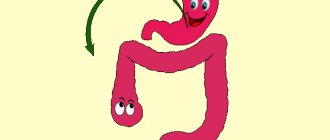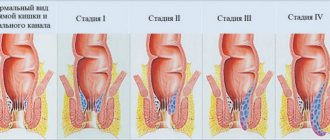The appearance of cutting pain after eating is a typical phenomenon for those who eat junk food. If a person regularly eats fatty, fried, salty or sweet foods, it will be difficult to avoid pain and damage to the intestines. However, the process of pain is affected not only by poor nutrition, but also by irregular nutrition. The stomach is susceptible to prolonged fasting and begins to produce excess gastric juice. Soon, patients develop gastritis, which develops into a duodenal ulcer.
If you have complaints about the gastrointestinal tract, you should consult a doctor. In a private clinic called “KDS Clinic” you will be provided with consultation and prescribed effective and inexpensive treatment. At our medical facility, you can undergo examinations to diagnose the disease even at an early stage. Our staff regularly undergoes advanced training courses.
We invite you to read reviews about our medical staff on the official website of the KDS Clinic. Afterwards, you can decide on the doctor with whom you would like to make an appointment and find out the prices. The site also contains information about medical examinations, the process of conducting them, as well as indications and contraindications.
Causes of pain
Abdominal pain after eating is a fairly common problem.
There are a huge number of reasons why abdominal pain occurs.
When pain appears in the lower abdomen after eating, which is aching in nature, acute appendicitis can be judged.
If the pain suddenly subsides, this indicates an intestinal rupture. In this case, the patient requires urgent medical attention.
In acute pancreatitis, the patient experiences pain in the upper abdomen. It may be encircling in nature or extend to the back or lumbar region. In some cases, the patient develops nausea and vomiting.
If the patient experiences pain in the epigastric region after eating, as well as nausea and belching, then acute gastritis may be the cause. Cramping pain in the navel area, accompanied by chills and general trembling, indicate intestinal colic.
In this case, antispasmodic drugs are taken. The patient is advised to adhere to bed rest and diet. In this case, the consumption of fatty, sweet, spicy and fried foods is strictly prohibited.
If a person experiences severe pain in the lower abdomen, which radiates to the lower back, then this indicates the development of an inflammatory process in the kidneys. In this case, the patient needs to urgently seek help from a doctor.
Acute pain that radiates to the lumbar and perineal area may indicate the passage of kidney stones. In this case, the patient needs to take antispasmodic medications and a warm bath. If blood appears during urination, it is recommended to contact a medical center.
Stomach pain - treatment
Treatment for stomach pain depends on the underlying cause. In the case of an active H. pylori infection, it is necessary to kill the bacteria using a combination of antibiotics and proton pump inhibitors (PPIs). The neutralizing effect of PPIs is also used in the treatment of peptic ulcers.
People with peptic ulcers or inflammation of the gastric mucosa are not recommended to use non-steroidal anti-inflammatory drugs such as ibuprofen, diclofenac, ketoprofen and others. They can worsen symptoms and add new ones due to side effects.
On the other hand, in case of pain, paracetamol and diastolic drugs, for example, drotaverine drugs, can be used.
In the treatment of functional dyspepsia, prokinetic drugs that improve the functioning of the digestive system may be useful. Because some cases of abdominal pain can be caused by stress, the help of a therapist may be needed. Antidepressants such as amitriptyline are used to treat such conditions.
Symptoms of pathology
If you have persistent abdominal pain, you should consult a doctor.
Abdominal pain is not an independent disease. This is a symptom that accompanies a certain pathological process.
It, in turn, may be accompanied by additional signs. If a patient has episodic pain in the abdominal area for a month, which is not accompanied by additional symptoms, then he can eliminate them independently using a variety of antispasmodic medications.
If episodic pain occurs over a longer period and is accompanied by additional symptoms, then the person needs to seek help from a doctor.
Quite often, when pathology appears, an increase in body temperature is observed, which indicates the development of an inflammatory process. Some patients complain of dark urine or light, pasty stools. Quite common symptoms of the pathology are nausea and vomiting. Representatives of the fairer sex may simultaneously experience vaginal bleeding.
Diagnosis of stomach pain - what tests should be performed?
When diagnosing abdominal pain, a carefully collected medical history is important. The primary diagnosis is made by when symptoms continue, when they occur, and then when they disappear. The rhythm of bowel movements and possible changes in the appearance of the stool are important. You should also tell your doctor about the warning symptoms mentioned earlier.
A blood test, including a complete blood count, may provide some information about gastrointestinal bleeding or nutritional deficiencies.
It is important to check for H. pylori infection. For this purpose, blood tests, stool tests, or a sample taken during a gastroscopy are most often performed. Gastroscopy is a key method for diagnosing peptic ulcers, as well as some inflammations of the gastric mucosa.
In case of abdominal pain, imaging tests, primarily ultrasound, are mandatory. They allow you to confirm or exclude, for example, gallstones or kidney stones. If symptoms do not go away and all organic diseases of the gastrointestinal tract are excluded, functional diseases of the digestive system, which can cause stomach pain, should be diagnosed. These include, for example, pain in the epigastrium.
Diagnosis of functional disorders is difficult, since during their course nervous pain in the stomach is possible. Therefore, a consultation with a psychiatrist may also be required.
How does abdominal discomfort occur after eating?
Many associate discomfort after eating with the stomach. But if you look at it, it turns out that the main processes of food digestion take place in the intestines. Of course, it is important what we eat, how we chew food, but in the end the “conductor of digestion” is the pancreas. It is she who produces special digestive enzymes, which in the intestines break down food (proteins, fats and carbohydrates) into simpler elements, helping the body digest and absorb it.
If for some reason there are not enough enzymes, then after eating you may experience discomfort, heaviness, bloating, and flatulence.
Home remedies for stomach pain
Home Remedies for Stomach Pain
Self-monitoring is very important when treating stomach pain. You should eat small portions and monitor how your stomach reacts to certain foods. Excluding or including certain ingredients for several days helps with this.
Anyone with peptic ulcers, gastritis or functional disorders should avoid smoking, drinking alcohol and drinking coffee. Coffee does not interfere with the healing of stomach ulcers, but after drinking coffee or drinking alcohol, stomach pain may intensify.
Some home remedies for stomach pain, such as baking soda, are also not recommended. Sodium bicarbonate neutralizes stomach acid to some extent, which helps with peptic ulcers or reflux disease, but excessive sodium intake is harmful, especially for people with cardiovascular disease.
Lozenges containing neutralizing agents based on calcium and magnesium salts can be used in limited quantities. But herbal medicines are not mentioned in official recommendations for the treatment of these causes of abdominal pain. In case of peptic ulcer and H. pylori infection, only pharmacotherapy is key and should not be replaced by herbs.
There are isolated reports in the scientific literature about the effectiveness of some herbs for functional dyspepsia. Turmeric, licorice root, peppermint, and celandine are mentioned. The capsaicin found in chili peppers is believed to reduce the transmission of pain in the abdominal organs. Because some cases of functional dyspepsia are caused by stress, herbal medications with a sedative effect, such as lemon balm or valerian, may be helpful. But any herbs cannot replace drug treatment, so they are taken only in combination with medications, and only as prescribed by a doctor.
Combination of heaviness in the stomach with other symptoms of diseases of the gastrointestinal system
With functional dyspepsia, during a thorough examination, it is not possible to detect organic damage to organs and tissues of the body.
The main cause of this disorder is considered to be impaired contractility of the duodenum. Functional dyspepsia, in addition to epigastric discomfort, is characterized by pain, nausea, vomiting, belching of air, and heartburn. The same symptoms are observed in various forms of gastritis, gastroduodenitis, acute and chronic ulcers. Most often, a prolonged feeling of fullness in the upper abdomen occurs with atrophic gastritis. It is characterized by a decrease in the secretion of hydrochloric acid, and therefore food lingers in the stomach for a long time. Atrophic gastritis is accompanied by decreased appetite, drooling, and belching with an unpleasant taste in the mouth.
Among the manifestations of acute ulcers, the dominant place is occupied by pain. However, as ulcerative defects heal, scars form that narrow the pylorus (the junction of the stomach and duodenum). This condition is called pyloric stenosis. In the early stages, pyloric stenosis is characterized by heaviness in the stomach after eating, nausea, and belching. When the disease decompensates, the feeling of fullness can be constantly disturbing, frequent vomiting of eaten food appears, and exhaustion develops.
Discomfort in the epigastric region with chronic pancreatitis is associated with a decrease in the ability of the pancreas to secrete digestive enzymes. These symptoms are combined with unstable, foul-smelling, greasy stools, and weight loss even with regular and proper nutrition.
With pathology of the biliary tract or liver, heaviness and pain spread to the right hypochondrium. Often there is a bitter taste in the mouth, yellowness of the skin and sclera.
In case of intestinal diseases, in addition to severity and pain, changes in the frequency and consistency of stool (constipation, diarrhea), flatulence, and bloating are observed.
In case of cancer, discomfort in the upper abdomen is combined with the following manifestations:
- change in taste preferences, aversion to meat;
- rapid loss of body weight;
- signs of anemia (weakness, dizziness, pallor of the skin, mucous membranes, palpitations);
- hypovitaminosis (brittle nails, hair, fatigue);
- pain is intermittent and unnecessary.
Important signs of food poisoning are vomiting, fever, headaches, general weakness, and frequent, loose stools.
Treatment of heaviness in the stomach associated with diseases of the gastrointestinal tract
If discomfort in the epigastric region bothers you periodically and is accompanied by other symptoms, then you should definitely seek qualified help from a gastroenterologist.
Even before an accurate diagnosis is established, the doctor recommends lifestyle and diet adjustments and prescribes certain medications. After determining the cause of heaviness in the upper abdomen, the specialist determines a therapeutic diet, and also recommends a specific combination of drugs, dosage regimen and duration of therapy. To get rid of stomach discomfort and accompanying manifestations of diseases, groups of medications are used.
- Enzyme preparations. Contain enzymes (amylase, lipase, protease) that are involved in digestion. Recommended for pancreatic dysfunction.
- Prokinetics. Helps normalize the motility of the gastrointestinal system.
- Antacids. Topical compounds that neutralize hydrochloric acid. Mainly used for insufficiency of the cardia and pylorus.
- Agents that reduce the production of hydrochloric acid. These include proton pump inhibitors, H2-blockers and M-anticholinergics. Prescribed for hyperacid gastritis, gastric and duodenal ulcers.
- Drugs that increase gastric secretion, they contain pepsin and acids necessary for atrophic gastritis.
- Gastrocytoprotectors. Medicines that protect against the effects of adverse factors and promote the healing of damaged areas of the walls of the digestive organs. These include analogues of prostaglandin E and bismuth salts.
- Antibiotics. They are part of complex therapy for the destruction of Helicobacter pylori.
- Drugs that affect the secretion and excretion of bile. Used for diseases of the liver and biliary tract.
- Laxatives. Recommended for constipation of various etiologies.











